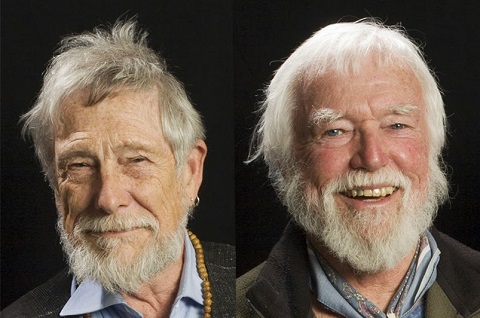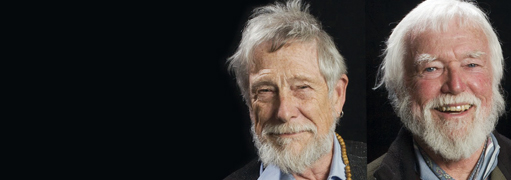In “Good Things That Can Be Said for the Iron Age,” a poem from 1970, poet Gary Snyder wrote, “A ringing tire iron dropped on the pavement / Whang of a saw brusht on limbs / the taste of rust.” Snyder’s poems bring in all the world. They seek a oneness between reader, writer and all of nature. A serious poet and a serious activist, Snyder will be in Albuquerque to speak as a part of Inspiring Adaptation, an environmental conference hosted by the Quivira Coalition. He will be one of the conference’s two primary speakers, and the other will be Santa Fe’s “Living Treasure” Jack Loeffler, a historian, artist, ethnomusicologist, writer, musician and activist. “The Quivira Coalition was started by Courtney White [and two others] to resolve tensions between ranchers and environmentalists,” says Snyder. Founded in 1997, the organization aims to improve land health and share knowledge. Ranchers and conservationists have much to learn from each other, according to Quivira, and it promotes what it calls “the New Ranch”—an idea of sustainable, profitable ranches that improve conditions for wild plants and animals even as they improve conditions for livestock.Inspiring Adaptation offers three days of talks by ranchers, urban planners, conservationists and scientists Nov. 13 through 15 at the Embassy Suites Hotel (1000 Woodward Place NE). Snyder and Loeffler begin their talks at 7:30pm on Wednesday, Nov. 13; tickets are $30. Loeffler, an oral historian with Native American and Hispanic roots, will discuss his interests in cultural diversity’s ability to solve major issues, and the relationships between indigenous cultures and their habitats. Snyder will explore land ethics as only someone with a background in poetry could do. He intends to base some of his discussion in the ideas of author-activist Aldo Leopold, he says, whose A Sand County Almanac introduced America to the idea of a “land ethic,” and he’ll compare and contrast attitudes toward the land in the Ten Commandments, Occidental traditions and Buddhism.“In the middle of killing each other constantly,” Snyder says, “we need to also think about the land.”Snyder also plans to talk about the differences between managing public lands in the Pacific Northwest and managing them in the Southwest. In particular, he’ll discuss the big question—what ranchers are going to do about climate change as the Southwest continues to dry out. And he’ll read some recent as-yet-unpublished poems. Considered a key member of the San Francisco Renaissance, Snyder has published more than 20 books of poetry and prose. His 1974 book of poetry, Turtle Island, won the Pulitzer Prize. And he has become a powerful voice for environmental activism.In the 1950s, in San Francisco, he was sought out by the poet Allen Ginsberg and welcomed into his circle of friends. Jack Kerouac based a character on Snyder—Japhy Ryder—in his novel The Dharma Bums. And Lawrence Ferlinghetti came to consider Snyder “the Thoreau of the Beat Generation.” But that was merely one chapter of Snyder’s long career, and today he’s quick to downplay and contextualize that association. “The Dharma Bums is fiction,” he says. “I am not Japhy Ryder. … I am of the political Left. And that’s where I joined with them, on the Left. And I’m not a solitary Thoreau-like person. I’ve had several families and two biological children.”Before the Beats tried to claim him, Snyder studied Buddhism and Zen. He translated the ancient poetry of Hanshan from Chinese into English and became fascinated by anthropology, linguistics and oral traditions. He studied Native American and Japanese lore. He worked remote jobs in fire-towers and forests. And, of course, he wrote.When Snyder was around 7 years old, he was playing barefoot on a burned-over area of his parents’ land in King County, Washington. This was in the latter half of the 1930s. His parents had been burning tree limbs and brush the week before, and he thought those ashes had cooled. They hadn’t. Snyder stepped on a still-burning coal, burned his foot badly, and for the next two months lay in bed, recovering and reading.“Those two months of amusing myself mostly by reading, those started me reading a whole lot of books,” says Snyder. “Ten or 12 a week from the Seattle Public Library. … That just got me into being a literate person, even though I came from a very hardscrabble background.”Now, in 2013, the American Southwest is in a similar state. It’s been injured by drought, fire and overgrazing, by power plants and strip mines, by jet-fuel spills, logging, fracking and more. It needs to recuperate. And all of us who live here could benefit from learning something as it does—from reading up, from being taught, from a chance to be still and listen and ask questions. This conference might be a good place to start.
Gary Snyder and Jack Loeffler speak at Inspiring Adaptation
Wednesday, Nov. 13, 7:30pmInspiring Adaptation continues through Nov. 15Embassy Suites Hotel1000 Woodward Place NEquiviracoalition.org, 820-2544, ext.2Tickets: $30










